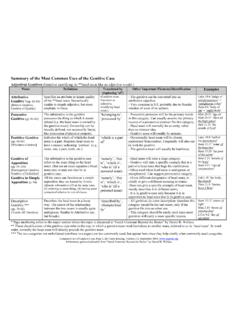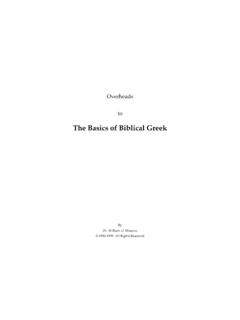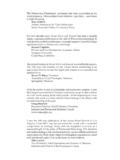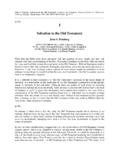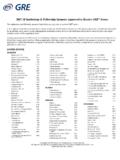Transcription of Evidence from History and the Gospels that Jesus …
1 Evidence from History and the Gospels that Jesus spoke greek By Corey Keating Professor Ed Nelson NS500 New Testament 1 Term Paper fuller theological seminary Phoenix Extension Fall Quarter 2002-3 The Evidence is as yet inconclusive as to what language Jesus would have normally spoken to the Jewish crowds or to his disciples. However, for nearly the last century, it has become practically a generally accepted tradition that the mother tongue of Jesus , the language he knew best and therefore usually spoke , was Aramaic. 1 This is mainly due to the conclusions of Dalman,2 who stated that , though Jesus may have known Hebrew, and probably spoke greek , he certainly taught in Aramaic. 3 Some New Testament scholars have even gone as far as to say that Jesus only spoke in Aramaic. 4 Based on more recent historical research and linguistic data, the purpose of this paper is to show that Jesus spoke greek , had the linguistic ability to teach in greek , and at times may indeed have taught in greek .
2 There may, in fact, exist instances recorded in the Gospels where Jesus conversed and possibly taught in greek . After this fact is established, this paper will call for a more serious consideration of the implications of this possibility by New Testament scholars and highlight the need for more research in this area. This paper will focus on the Biblical text from both an historical and literary perspective. First of all, it will give a brief overview of what is known historically of the languages spoken in first-century Palestine. This will serve to establish the scope of Jesus linguistic possibilities and then to determine what languages Jesus probably spoke . It will next give an analysis of the words of Jesus that are recorded in the Gospels , particularly the occurrences of Aramaic words in the gospel of Mark, in order to further determine what languages Jesus spoke . Lastly, it will examine a particular case study from a gospel pericope in which it seems most probable that we can ascertain the very greek words that Jesus spoke .
3 1 J. N. Sevenster, Do You Know greek ? How much greek could the first Jewish Christian have known? Translated by J. de Bruin (Leiden, Netherlands: E. J. Brill, 1968), 33. 2 See G. Dalman, Jesus -Jeshua: Studies in the Gospels (trans. Levertoff; London, SPCK 1929). 3 Stanley E. Porter, Did Jesus Ever Teach in greek ? Tyndale Bulletin, 44 (1993), 199. 4 G. R. Selby, Jesus , Aramaic & greek (Doncaster, England: The Brynmill Press Ltd, 1989), 4; (Referring to Robinson, Can We Trust the New Testament , Oxford, 1977, pg. 31). Page 2 Limitations and Assumptions Because the majority of scholars have previously made the assumption that Jesus normally taught in Aramaic, there has been much research and numerous volumes written over the last century analyzing the Aramaic statements of Jesus in order to ascertain what type of Aramaic Jesus actually spoke . Furthermore, since the time of Dalman, many scholars have operated under the assumption that the Hebrew -speaking Jews of Palestine actually spoke Aramaic, and not Hebrew.
4 Hence it is assumed that , wherever mention is made of the Hebrew language .. in the New Testament .., Aramaic is what is actually meant. 5 But even this can no longer remain uncontested. It appears from more recent archeological and linguistic Evidence that in Jesus day Hebrew occupied a more important position than was formerly thought. 6 Various scholars have concentrated on this topic so that they would understand how to most properly take up the task of trying to get back to the actual words of Jesus by retro-translating from greek into the appropriate dialect of Aramaic or Hebrew. The discovery of the Dead Sea Scrolls has shed much light on this area of study. However, because this paper is contending for the role of greek in Jesus ministry, it is beyond the scope of this paper to discuss what dialect of Aramaic or Hebrew that Jesus might also have spoken. Furthermore, due to this assumption that Jesus only taught in Aramaic, since the late nineteenth century.
5 Scholars have argued for the existence of Aramaic sources for the Gospels , and even in extreme cases for Aramaic originals for the Gospels themselves. 7 Nigel Turner, a reputed greek linguist, says that stylistic Evidence suggests that it is too extreme to think that 5 J. N. Sevenster, 34; (Referring to G. Dalman, Die Worte Jesu, 2nd, 1930, p. 1). 6 Ibid., 34. 7 Joel B. Green and Scot McKnight, eds., Languages of Palestine, Dictionary of Jesus and the Gospels (Downers Grove: InterVarsity Press, 1992), 443. Page 3 the Gospels were written at first in Palestinian Aramaic. 8 I agree with Turner and others that although the probability that Aramaic or Hebrew sources for the teaching of Jesus did exist at an earlier stage cannot be excluded, it seems more probable that the Gospels themselves were written in a kind of greek which was inoculated with Semitic syntax and style. 9 Whether or not there existed earlier oral or written sources from which the current Gospels were written, I concur with the scholarly consensus ,10 and it is the assumption in this paper, that the Gospels which we currently possess were originally composed in greek and are not literalistic translations from an Aramaic or Hebrew original.
6 The most that can safely be said is that an Aramaic sayings-source or sayings-translation lies behind the synoptic Gospels . 11 It is beyond the scope of this paper to discuss the current scholarship or give an historical outline regarding possible Aramaic sources for the In the last couple centuries there has also been much research done regarding the type of greek that was spoken in ancient Palestine. Even more pages have been written regarding the kind of greek that was used in writing the New Testament. This paper will not discuss the dialect or kind of greek Jesus and other ancient Palestinians would have spoken, nor the kind of greek used to write the Gospels . Once the fact has been established that ancient Palestine was a bilingual or trilingual society, it seems intuitive that the greek of the Gospels is one that will 8 Nigel Turner, Style, vol. 4 of A Grammar of New Testament greek , by Moulton (Edinburgh: T&T Clark, 1976), 5.
7 9 Ibid., 2. 10 Stanley E. Porter, Did Jesus Ever Teach in greek ? , 209. 11 Nigel Turner, Grammatical Insights into the NT, (Edinburgh: Clark, 1965) ; reprinted in Stanley E. Porter, The Language of the New Testament: Classic Essays (Sheffield: Sheffield Academic Press, 1991), 175-6. 12 For more research on this matter see Nigel Turner, Style, vol. 4 of A Grammar of New Testament greek , by Moulton (Edinburgh: T&T Clark, 1976), Chapter 2, Sources Behind the Gospels ; and cf. Joel B. Green and Scot McKnight, eds., Languages of Palestine, Dictionary of Jesus and the Gospels (Downers Grove: InterVarsity Press, 1992) 443-4; in order to read the arguments supporting Aramaic sources for the Gospels , see Maurice Casey, Aramaic Sources of Mark s gospel (Cambridge: Cambridge University Press, 1998). Page 4 have numerous incursions from the Aramaic language, which many Jewish people spoke as their primary language. This paper also assumes the two-document (or four-document) hypothesis for the Synoptic Gospels with Mark being the first gospel that was This assumption fits in well with my thesis since it is Mark who uses the most Aramaic terms, which are analyzed below.
8 Languages Used in Ancient Palestine, Particularly in Galilee Before looking at linguistic data, it is important to consider the historical and sociological context of first-century Palestine in order to determine what languages were customarily spoken in that region. This will help determine the range of languages that first-century Palestinians spoke and thus the probable languages of Jesus . The presentation here will only be a brief survey of the conclusions drawn by the many thorough studies that have been done on this topic. It will be shown here that the Evidence points to the fact that first-century Palestine was multilingual with at least Aramaic and greek widely spoken. Some form of Hebrew possibly was vernacular, but it was surely a written language. Latin was used primarily by the Romans in political and administrative matters. 14 The two languages pertinent to this discussion are Aramaic and greek . Whether or not Jesus spoke Hebrew is not as germane to this topic.
9 It is commonly recognized among most scholars that it would seem that Aramaic was the best-known and most widely used language among Jews of all classes in Galilee and in Judea also, at least in the larger urban areas. 15 However, at the same time it is recognized by many that There is Evidence that greek was a 13 Cf. Joel B. Green and Scot McKnight, 784-92. 14 Stanley E. Porter, The Language of the New Testament: Classic Essays (Sheffield: Sheffield Academic Press, 1991), 27. 15 Joel B. Green and Scot McKnight, 439. Page 5 living tongue among first-century Jews even around Jerusalem. 16 But significance of the widespread use of greek has been so often overlooked in its bearing upon the question at hand. Therefore, the following discussion will highlight some of the Evidence for greek being a more widespread language in first-century Palestine than some scholars have recognized. It will be shown that greek was not only the most common language among gentiles in the Roman Empire, but was a widespread language even among the Jewish nation.
10 It has been universally acknowledged by virtually everyone who has studied the matter that greek was the lingua franca of the Graeco-Roman world and the predominant language of the Roman Empire. 17 Because it was the language of the Empire, it held a place of prestige in that it dominated the political, educational, and economic environment even of Palestine itself. This means that there would have been cultural, social and especially linguistic pressure to learn greek in order to communicate broadly within the social structure. 18 Furthermore, Evidence continues to increase regarding the strong influence of the greek language and culture in lower Galilee, the region where Jesus grew up. Highlighting the Evidence of Hellenistic influence in Galilee is the fact that Matthew refers to that region as Galilee of the Gentiles. 19 Jesus hometown, Nazareth, was located just four miles from the largest Galilean city, Sepphoris which was a Hellenistic-Roman city where the Hellenistic culture, not Judaism, was This Hellenistic culture, which implied the use of greek , dominated every aspect of life and society.

